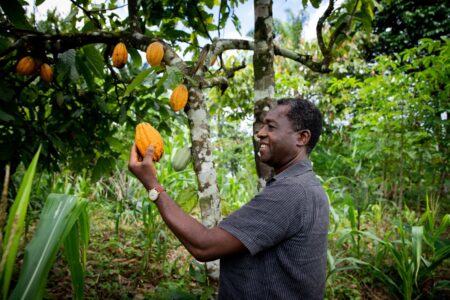ICCO expresses concerns over upcoming cocoa crops, with global production levels forecast for decline

West African cocoa production (picture ICAM)
The International Cocoa Organisation today has projected a notable 6% decline in global production of cocoa to 4.923 million tonnes for the 2021/22 season, amid major headwinds from the Russian invasion of Ukraine, trade disruptions and increased freight costs, writes Neill Barston.
According to the industry body, market uncertainties were likely to affect ‘the quantity, size, quality’ of crops next year – with concerns already being expressed for conditions on the ground for many farmers in the sector based in key supplier markets of Ghana and Ivory Coast.
The ICCO noted in its quarterly bulletin that there were several factors including adverse weather conditions and diseases are negatively affecting production for the ongoing season, which has seen observers express considerable fears for those in agricultural communities amid the pandemic, which has seen ‘farmgate’ prices continue to follow a downward path. Consequently, major concerns remain over the potential for farmers to earn a living wage from producing cocoa – with many still earning around $1 a day, which stands at significantly below present UN-defined poverty levels.
While production is expected to be down, the ICCO said that grindings are in fact expected to increase by almost 2% to 5.048 million tonnes, with the ICCO stating that the gap will be covered by a reduction in stocks of 9%.
While the ICCO explained there were concerning factors surrounding global geopolitical and economic challenges, cocoa demand for the first half of the 2021/22 season has so far sustained a positive stance.
Factors which contributed to the increase in cocoa demand include the resumption of activities in the air travel sector, which is a major gateway for chocolate sales as well as the recommencement of seasonal festivities. Positive quarterly earnings reports from major confectionary manufacturers for the period January – March 2022 also reveal that confectionery sales, which include chocolate, have picked up and are heading or at par with pre-COVID-19 era trends.
Since 1973, the ICCO has been working as an inter-governmental organisation, created under the auspices of the United Nations and operating within the framework of successive International Cocoa Agreements. The ICCO is headquartered in Abidjan, Ivory Coast. It presently comprises 52 Members, of which 23 are cocoa exporting countries and 29 are cocoa importing countries. These Member countries together represent 97% of world cocoa exports and 80% of world cocoa imports.



